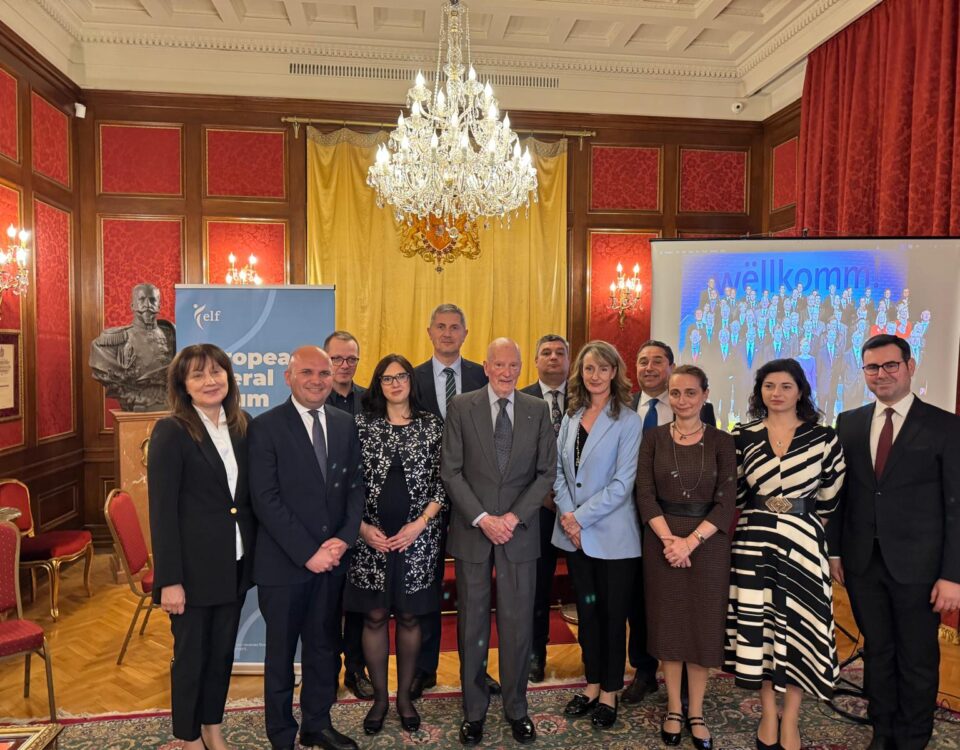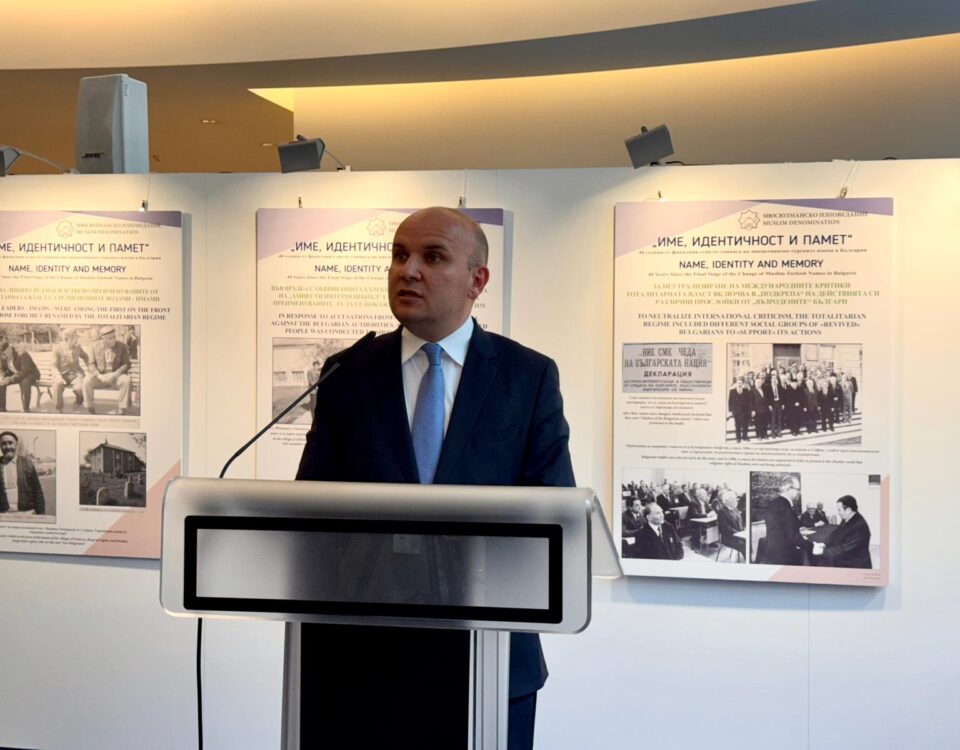
Ilhan Kyuchyuk: Protecting our shared values unites us and makes us Europeans
October 15, 2020
Ilhan Kyuchyuk: Western Balkans countries should be a strategic priority of the EU
November 6, 2020Interview for 24 hours online
24 hours: Mr. Kyuchyuk, a national conference of the Youth MRF is forthcoming, at which a new leadership will be elected. At the last one you were re-elected president, will you run for a third term now?
Kyuchyuk: I am not a candidate in this election. My generation helped and gave security and development to the organization. Now is the time for new, faster growth that can come from the next generation. Time demands it!
24 hours: The youth conference is expected to be held entirely online for the first time, but you have over 350 delegates who must vote on the election of the new leadership. How exactly will this happen?
Kyuchyuk: Despite global closure, we remain open to the world because empathy and responsibility are our DNA. Because we have proved that we are not only part of modern Bulgarian society, we actively participate in its construction. Togetherness as a notion of human closeness is now being transformed into contact with electronic devices. Keeping up with the times – modern and innovative – is not enough. We are now committed to looking to the future. Moreover, to bring the future today. To set the most ambitious goals and the highest standards in order to be one step ahead of others. This is such a valuable step that makes the difference. We will convey this message through the capabilities of social media. Yes, there are 357 delegates, but there will be thousands together.
24 hours: After the youth, the national conference of the MRF follows, there are already speculations that the movement may have a new leader. Is it time for some change at the top of the party?
Kyuchyuk: The MRF has always combined tradition and modernity in party building. There is no other party that believes so much in the generational dialogue and works actively for its development and establishment. Proof of this is the fact that the first chairman of the Youth MRF, Mr. Mustafa Karadayi, is today the chairman of the MRF. The young people of the MRF are extremely satisfied with this fact.
24 hours: Have you set the date yet?
Kyuchyuk: The decision of the central leadership was for December 12, but as you can see we live in a very dynamic world.
24 hours: The resolution of the European Parliament, initiated by Elena Yoncheva and Radan Kanev, resonated very strongly in our country. Is it appropriate for Bulgarian MEPs to pursue such initiatives that hurt their country?
Kyuchyuk: The fact that there is a debate and a resolution for an EU member state is not a problem in itself. We have had similar debates for Hungary, Poland, Malta, Slovakia, Spain. Democracy is not a word depleted of content. Human rights and freedoms are not crushed and thrown in the trash. The question is what’s next? Because neither the debate nor the subsequent resolution achieved its goals.
24 hours: And why, according to the MRF, Bulgarian politicians “got lost in the translation” of the Brussels report on the new mechanism?
Kyuchyuk: Maybe because for the most part they had read it in a language foreign to them, or in their haste they hadn’t read it completely. But if we take the subject more seriously, the report is very thorough. Reports on the results achieved in a number of key areas and notes delays or retreats. You see, the report is a good opportunity to continue the dialogue with the EC. Let us not forget that this is the first but very important step towards creating a single mechanism for democracy. This helps the rule of law and fundamental rights and freedoms.
24 hours: The EP will also consider the report on democracy, the rule of law and fundamental rights and freedoms for Bulgaria. What do you expect?
Kyuchyuk: I expect a more in-depth discussion of the first five countries in alphabetical order, including Bulgaria. The topic is set for discussion by the Council in the format of Ministers for European Affairs. The meeting is on November 10.
This is not expected to lead to any formal outcome, such as Council conclusions or a resolution.
However, an analysis of the judicial system for the five countries is expected. It will also be considered in the framework of the Justice and Home Affairs Council either on 13 November or at its December meeting on 3-4 December.
24 hours: As an MEP, you voted “yes” to a document, part of the Green Deal, which obliges EU countries to reduce their harmful emissions by 55% by the end of 2030. However, Prime Minister Borissov warned that this means closing mines and leaks, where is the way out ?
Kyuchyuk: The MRF program for development of Bulgaria is based on the philosophy of growth based on a clean environment, prevention and adaptation to climate change and green innovative technologies.
We strongly support the Green Pact, the EU’s new growth strategy. Climate law is an essential part of the Green Pact. In fact, we have supported a 60% reduction in emissions by 2030 as the EP’s negotiating position. The Council’s position is 50-55% and it is supported by Borissov.
Borissov’s claims show three things – he does not realize that reducing emissions is a strategic goal of the EU in connection with the technological revolution. Bulgaria cannot afford to be out of this process. Secondly, the Prime Minister does not realize that the responsibility for drawing up a national plan for this transition lies with the government. And thirdly – no one expects us to close mines and thermal power plants tomorrow. But we must have a national vision of how to achieve the goals step by step, step by step, with a network of environmental, economic and social measures. Not without significance is the fact that for this we can receive serious financial support from the EU.
24 hours: As rapporteur for the accession of North Macedonia to the EU, are you optimistic that the members of the joint commission can find an adequate common reading of history? And if this does not happen within a reasonable time, should Sofia block Skopje for EU membership?
Kyuchyuk: The key point of the 2017 contract is the word “common”. It aims to highlight our common past, but also to provide a horizon for our common future, which is linked to NATO and the EU. If there is a misunderstanding of some parts of the contract or greater precision is required, further explanations may be used. There are a number of possibilities for this in international relations. The Joint Historical Commission has reached a number of common conclusions and it is important to continue working, but the main responsibility lies with politicians. They need to show leadership.
It is in the strategic interest of all of us for the Western Balkans to be an integral part of the EU, to become an area of shared democratic values.
Тази публикация е достъпна и на следните езици: Bulgarian




